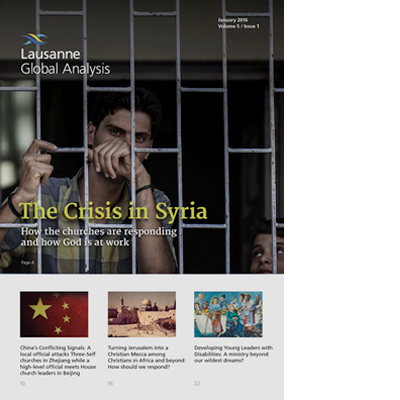Welcome to the January issue of Lausanne Global Analysis. We look forward to your feedback on it.
In this issue we focus on the witness of the churches in war-torn Syria and how we can support and learn from them; the questions raised by the Chinese government cracking down on registered churches while at the same time initiating dialogue with House church leaders; the trend among some Christians towards turning Jerusalem into a Christian Mecca and how we should respond; and on how developing young leaders with disabilities strengthens the body of Christ.
‘The churches in Syria (and Iraq) are facing major challenges amid the current regional crisis’, writes an anonymous Syrian pastor. The church was not prepared to deal with persecution or oppression, but is catching up rapidly. Caring for people of other faiths was not a priority before, but now evangelism and social action are going hand in hand. In the last two to three years, Lebanese and Syrian pastors say they have seen more Muslims come to faith in Christ than in their whole lives. God is bringing them as refugees to hear the gospel. The church has a brighter future. It will continue its witness with help from Christians from other lands, but it can do much more than in the past. Christians outside the region should become more aware of what is going on, arming themselves with good information—not just about the bad news, but about the good things God is doing. Prayer is crucial. ‘We can learn . . . lessons for churches everywhere if we stand with solidarity with the church in the Middle East’, he concludes.
‘Even the experts are baffled. Legally registered Three-Self Patriotic churches are under attack while the illegal House churches are invited into official dialogue. Is China heading for another Mao-era persecution or opening up to an era of religious freedom?’ asks David Ro (Director for the Christy Wilson Center for World Missions at Gordon-Conwell Theological Seminary). House church legalization would be hotly debated, but would have many benefits. One of the most significant is that a legal environment increases the scope to develop effective sending structures for sending missionaries abroad. As the country apparently moves in a Neo-Maoist nationalistic direction, we can expect more bad news to come. However, God is answering the prayers of the global church for China and its leaders. Good news is on the horizon because a God-timed spiritual working appears to be taking place in the hearts of some of China’s top leaders. ‘It does not make sense in this current political environment, but is God preparing China’s role in global missions?’ he concludes.
‘Christian pilgrimages to Jerusalem have increased greatly within the last decade’, writes Kwabena Asamoah-Gyadu (Baeta-Grau Professor of Contemporary African Christianity and Pentecostalism at the Trinity Theological Seminary, Legon, Ghana). However, in contrast to Islam, Christianity neither privileges a particular geographical location as the centre of Christian practice nor sees any form of pilgrimage as critical to the expression of faith. There is no such thing as ‘Christian culture’ or ‘Christian civilization’ in the sense in which there is Islamic culture or Islamic civilization. The principle of the incarnation, with God translating into flesh, brings Jesus Christ to the heart of each culture. God is spirit and those who seek to worship him must do so in spirit and in truth. Visits to the land of the Bible can help people to connect what they read with what they experience. ‘However, Christians need to be careful not to institutionalize religious tourism to Jerusalem in a way that seems to suggest that it is mandatory for achieving the fullness of life that God makes available to us in Christ Jesus our Lord’, he concludes.
‘There is a disappointingly small number of leaders with disabilities in local churches and other Christian organizations’, writes Dave Deuel (Senior Research Fellow for the Christian Institute on Disability). However, there is hope, and we can rejoice in the progress that they have made. God has prepared and gifted some people with disabilities for such leadership roles. This will unquestionably strengthen the body of Christ, for all parts will be serving. Also the church needs to learn from their wisdom gained through suffering. They can offer spiritual insights into physical, emotional, and social suffering that the church needs to hear. If we remove the obstacles in their path, the church will discover that many are gifted deacons, teachers, pastors, and missionaries. They will also be able to reach into the disability communities to evangelize, equip, and train the next generation of effective disability leaders. ‘Opening doors for young leaders with disabilities will be a ministry beyond our wildest dreams and bring us irresistible joy’, he concludes.
Whether you are planning to read the full articles or just the executive summaries, we hope that you find this issue stimulating and useful. Our aim is to deliver strategic and credible analysis, information, and insight so that as an influencer you will be better equipped for the task of global mission. It’s our desire that the analysis of current and future trends and developments will help you and your team make better decisions about the stewardship of all that God has entrusted to your care.
Please send any questions and comments about this issue to analysis@lausanne.org. The next issue of Lausanne Global Analysis will be released in March.

